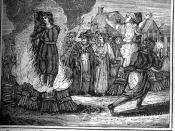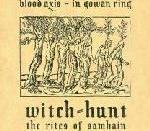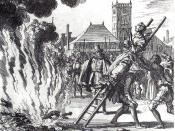The Crucible Many of the characters in The Crucible become changed by the end of the play.
Three of the characters who change a lot are John Proctor, Reverend Hale, and Mary Warren. It is shown that John Proctor changes in his willingness to have anything to do with the witch hunt and his moral decisions. Reverend Hale changes his personal outlook on and role in the witch hunt throughout the play, and he changes his general attitude towards the justness of witch hunts, the court, and the church. Mary Warren changes her mind about her role in the witch hunt several times, and she also must change her morals or ideas about sin. Each character's changes make huge impacts their lives and the lives of others.
John Proctor changes a lot throughout the play. At the beginning of The Crucible, he is willing to sit back and let things happen.
He does not want to involve himself in the witch hunt or risk getting himself into any trouble. Even though he knows that Abigail and the other girls are lying, and many innocent people are being accused of witchcraft, he doesn't do anything about it until his wife is accused. At the end of the play, however, he is willing to lie down his own life. Dying, he takes part of the responsibility for the other innocent deaths, deaths that he is responsible for because of his delay in exposing the truth. Sacrificing his life is also the only way that he can try to break the authority of the church and court. John also changes in the sense that, at the beginning, he withholds the truth, which is a sin, but at the end he tells it all, even at great expense to his reputation, or name, because he realizes that his soul is much more important than his life. In the beginning he doesn't care about what is morally right, he just looks out for himself. In the end he makes a great decision based on his morals after a long and difficult battle with himself.
Reverend Hale also changes throughout The Crucible. At the beginning he is very excited about starting a witch hunt, and even brings about the first confessions and accusations by putting words into the mouths of Tituba, Betty and Abigail. Throughout the play, he realizes what is really going on, and he finally understands what the girls are doing. He tries to make Deputy Governor Danforth understand that the girls are all lying and have caused this witch hunt just to protect themselves, but Danforth won't listen.
Reverend Hale even tries to save the lives of Rebecca Nurse and the Proctors after the court has declared them to be witches. The reverend seems to have abandoned his faith, however, or at least been shaken in his beliefs, because in the end he is more concerned with saving the lives of innocent people by making them lie and confess to witchcraft, than letting them follow the right path and die with a pure heart and soul. Reverend Hale also changes in his attitude towards witch hunts and the role the church plays in them. At the beginning of the play he believes that he, as a witch hunter, is doing God's work by either killing or getting a confession out of every person who may be a witch. At the end he realizes how twisted and false the whole investigation is, and that people can't play God.
Mary Warren is a character who also changes quite a bit. In the beginning she goes along with Abigail and the other girls, even though she knows that she is at least partly responsible for everything that is happening, and that going along with Abigail's lies must be a really big sin. Later on, though, she changes her mind, and tells the truth. She tries to convince Deputy Governor Danforth that there are no witches, but Abigail goes against her, and Danforth is not convinced. When it finally comes down to Mary being accused of witchcraft, she gives up, admits to working for the Devil, and blames it on John Proctor. Even though she saves her own life, more die because of it.
Many characters in this play are changed by the end. John Proctor, Reverend Hale, and Mary Warren all change a lot, whether by their willingness to have anything to do with the witch hunt, their moral decisions, their personal outlook on and role in the witch hunt, their general attitude towards the justness of witch hunts, the court, and the church, or their ideas about sin. Their changes make huge impacts on themselves and others.





